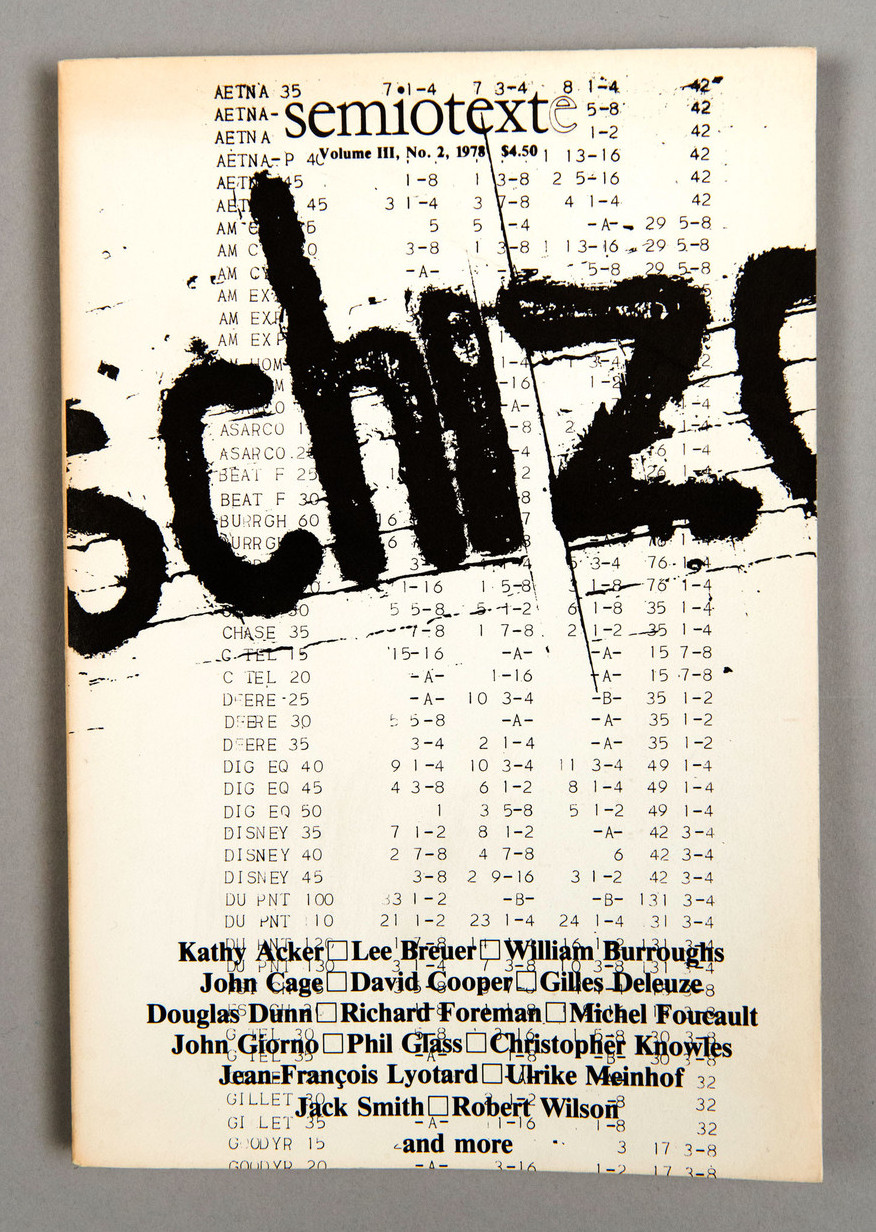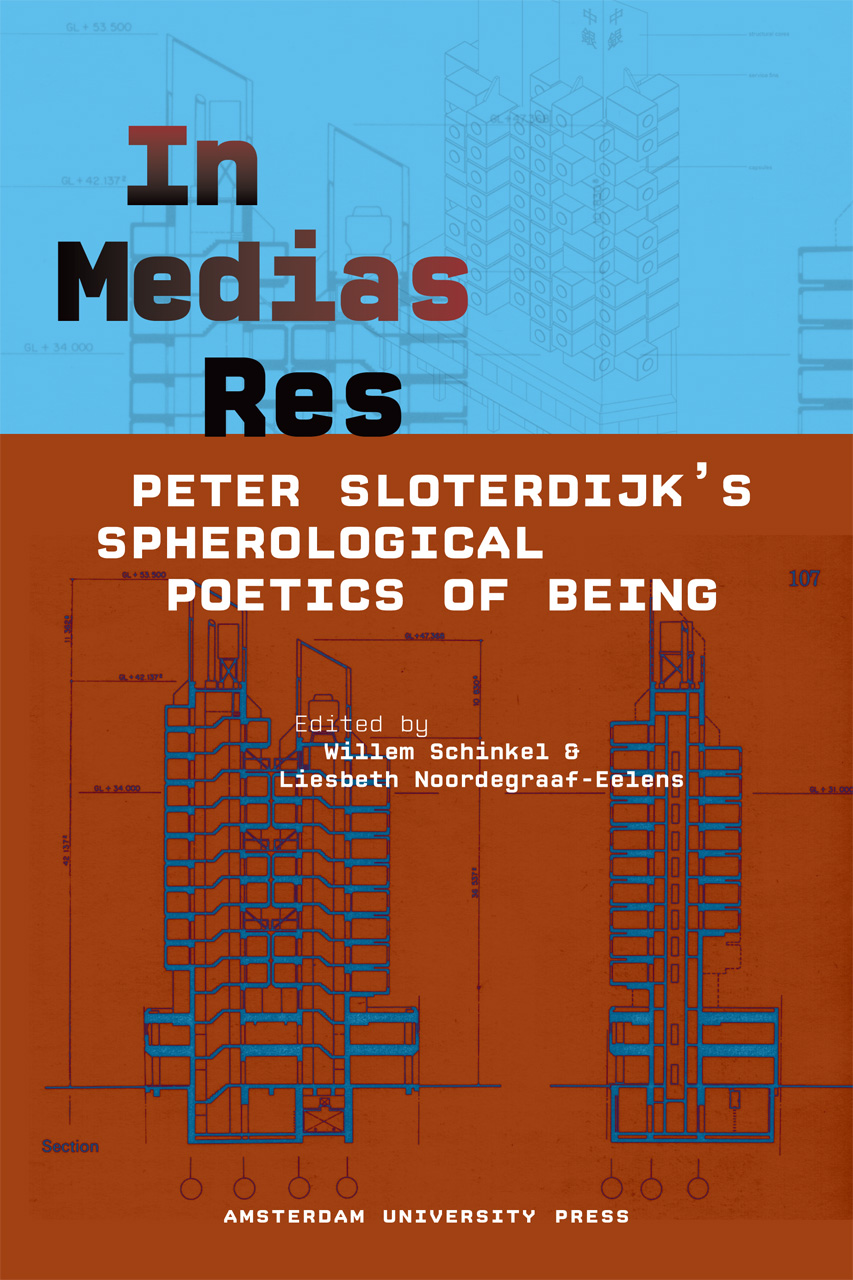Semiotext(e), 3(2): Schizo-Culture (1978)
Filed under journal | Tags: · anti-psychiatry, capitalism, linguistics, literature, philosophy, politics, power, psychoanalysis, schizoanalysis, schizophrenia, semiotics

“Semiotext(e) began in 1974 as a journal started by French philosopher Sylvère Lotringer in an effort to bridge radical French theory and the intellectual and art worlds of New York City. The original editorial board included ten people, mostly graduate students at Columbia University where Lotringer teaches, who chipped in fifty dollars apiece to get the journal started. They held their first conference in 1975: the Schizo-Culture conference on prisons and madness. Speakers included Gilles Deleuze, Félix Guattari, Michel Foucault, and Jean-François Lyotard, now all staples of the Semiotext(e) backlist.” (from Wikipedia)
With contributions by Kathy Acker, Lee Breuer, William Burroughs, John Cage, David Cooper, Gilles Deleuze, Douglas Dunn, Richard Foreman, Michel Foucault, John Giorno, Phil Glass, Christopher Knowles, Jean-Francois Lyotard, Ulrike Meinhof, Jack Smith, Robert Wilson, and others.
Edited by Sylvère Lotringer
Publisher Semiotext(e), New York, 1978
ISSN 00939579
221 pages
PDF (8 MB, updated on 2013-12-8)
See also Semiotext(e), 3(1): Nietzsche’s Return (1978).
Comments (2)Félix Guattari: The Anti-Œdipus Papers (2006)
Filed under book | Tags: · body without organs, capitalism, desiring machines, deterritorialization, philosophy, production, psychoanalysis, schizoanalysis, schizophrenia, semiotics

“‘The unconscious is not a theatre, but a factory,’ wrote Gilles Deleuze and Félix Guattari in Anti-Oedipus (1972), instigating one of the most daring intellectual adventures of the last half-century. Together, the well-known philosopher and the activist-psychiatrist were updating both psychoanalysis and Marxism in light of a more radical and ‘constructivist’ vision of capitalism: ‘Capitalism is the exterior limit of all societies because it has no exterior limit itself. It works well as long as it keeps breaking down.’
Few people at the time believed, as they wrote in the often-quoted opening sentence of Rhizome, that ‘the two of us wrote Anti-Oedipus together.’ They added, ‘Since each of us was several, that became quite a crowd.’ These notes, addressed to Deleuze by Guattari in preparation for Anti-Oedipus, and annotated by Deleuze, substantiate their claim, finally bringing out the factory behind the theatre. They reveal Guattari as an inventive, highly analytical, mathematically-minded ‘conceptor,’ arguably one of the most prolific and enigmatic figures in philosophy and sociopolitical theory today. The Anti-Oedipus Papers (1969-1973) are supplemented by substantial journal entries in which Guattari describes his turbulent relationship with his analyst and teacher Jacques Lacan, his apprehensions about the publication of Anti-Oedipus and accounts of his personal and professional life as a private analyst and codirector with Jean Oury of the experimental clinic Laborde (created in the 1950s).”
Edited by Stéphane Nadaud
Translated by Kélina Gotman
Publisher Semiotext(e), 2006
Foreign Agents series
ISBN 1584350318, 9781584350316
437 pages
PDF (updated on 2017-6-26)
Comment (0)Willem Schinkel, Liesbeth Noordegraaf-Eelens (eds.): In Medias Res: Peter Sloterdijk’s Spherological Poetics of Being (2011)
Filed under book | Tags: · aesthetics, attention, biopolitics, capitalism, critique, information society, mass media, philosophy, politics, posthumanism, religion, theory

“In recent years, Peter Sloterdijk has become one of Germany’s most influential thinkers. His diverse body of work includes a Heideggerian project to think “space and time,” a Diogenes-inspired affirmation of the body, and a Deleuzian ontology of network-spheres. This highly accessible collection of essays brings together a team of internationally renowned scholars, including Sjoerd van Tuinen, Rudi Laermans, Peter Weibel, and Bruno Latour, to provide a series of critical reflections on Sloterdijk’s oeuvre.”
Publisher Amsterdam University Press, Amsterdam, 2011
Creative Commons Licence BY-NC 3.0 License
ISBN 908964329X, 9789089643292
204 pages

